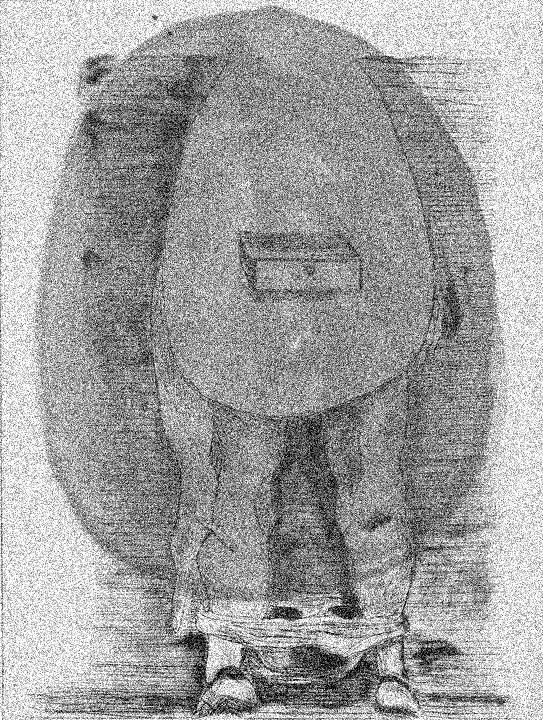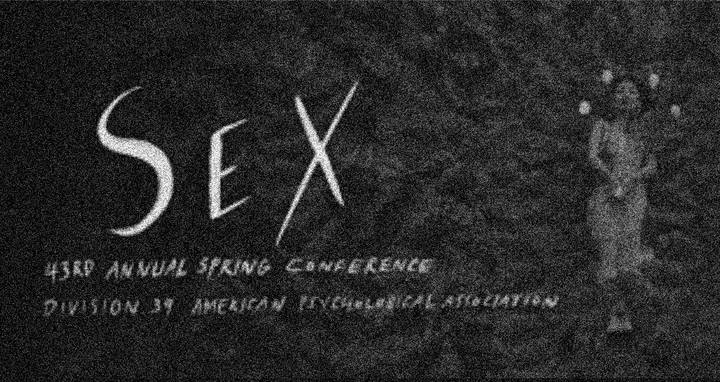The Anus: An FAQ, Part Four
Obsessives fear that without the silly rituals, their own anality might seep out in the form of paranoia.

“Scatet totus orbis.”
Martin Luther
Part Three of The Anus: An FAQ is available here.
Q: Is it possible to live inside the rectum?
For the non-obsessive, the obsessional neurotic’s repetitive, meaningless rituals appear undermotivated. What is really going to happen if order and cleanliness are not symbolically maintained? Is having everything in its right place really worth the cost of chronic irritability? We want the rat man to just relax, to expulse a little and loosen his grip.
Mary Douglas provides a helpful explanation of this pop psychology in Purity and Danger. While the rituals through which we keep dirt in its proper place are tremendously important in “primitive” societies based on “mechanical solidarity,” where the tribe is at risk of falling apart without the constant symbolic affirmation of collectivity, they become less crucial in societies of “organic solidarity,” i.e. modern societies with “special forms of social coercion, special monetary incentives to conform, special types of punitive sanctions, specialized police and overseers and progress men scanning our performance, and so on, a whole paraphernalia of social control which would never be conceivable in small-scale undifferentiated economic conditions.” “Without forms filled in in triplicate, without licenses and passports and radio-police cars [primitive societies] must somehow… commit men and women to its norms,” and their way of doing so is to rely upon acts of symbolic efficacy that look very much like obsessional rituals. If there is a tendency in contemporary society to look upon obsessive actions as altogether “too much,” it is because they no longer hold society together in this way. From this angle, they appear, and are, a relic of superstitious thinking. In fact, if the conclusion of the previous section is to be followed, obsessive behavior in capitalist society is not about keeping intact a fragile society but rather about fragile individuals proving their obedience to an overly strong society.
Fear of “falling behind” by inadequately prioritizing use-value for others is no doubt a legitimate and animating concern (anality is more narrowly rational today than it has ever been), but a deeper fear, one that attracts the word “transhistorical,” drives the obsessional neurotic. This is a fear of descending into the most frightening chamber of what Donald Meltzer calls “the claustrum.” This compartment is a
region of psychic reality where the atmosphere of sadism is pervasive and the hierarchic structure of tyranny and submission forebodes violence…. Seen from the inside, intruded into by stealth or violence in anal masturbation or anal assault, it is a region of satanic religion, ruled by the great fecal penis, the world of Orwell’s “Big Brother”…. [It is] a world of assumption rather than thought, where right means either the law or precedent, where to be genuinely different means to be detected as an intruder by the great “Jew Detector.” The prisoners of this system, where the term claustrophobia takes on its most poignant significance, have only two choices: outward conformity or joining as lieutenants of the great leader, the fecal penis.
The claustrum in general is, for Meltzer, composed of parts of the mother’s body (specifically her head/breast, genital, and rectum) as they have been internalized within one’s psychic reality. To live in the head/breast is to defensively think one knows or has everything one needs. To live in the genital compartment is to be “dominated by a primitive priapic religion,” where life revolves around a celebration of the erect penis. And to live in the rectum, “the area of intrusive identification which contains the greatest potentiality for serious mental disturbance,” is to be immersed in this underworld of sadism and paranoia, one ruled by the fecal penis.
In a gnomic construction, Meltzer argues that “the great fecal penis is not an object, but a self object, compounded of a bad (disappointing, deserting) object and a cold (minus LHK) part of the self at part object level, therefore primitive.” In admittedly reductive terms, this means the fecal penis is a composite of all of one’s negative experiences in the world along with the cold, hypocritical, and philistine aspects of the self. Somehow this “malignant character of the combination” is elevated in the unconscious to the position of leader. Meltzer is here expanding upon Wilfred Bion’s idea that groups tend to fall into the “basic assumption” that they cohere as a group in their dependence upon a strong leader, one who is without exception a “paranoid schizophrenic or malignant hysteric.” Without really understanding why a dependent group “when left to its spontaneous behavior, chooses as its leader… its most ill member,” Bion finds the example of groups “sustaining, placating, soothing, flattering, and deferring to” psychopathic personalities all around us, from religion to politics.
Meltzer’s contribution was to have explained Bion’s dependent group, one governed by a paranoid-schizoid leader, as the result of living in the maternal rectum, a compartment dominated by the fecal penis. If one accepts Guy Hocquenghem’s assertion that “phallic pleasure is the raison d’être of heterosexuality, whichever sex is involved,” and that it is “homosexual desire [that] restores the desiring use of the anus,” then the basics of this theory of the paranoid universe existed very early on in psychoanalytic theory, beginning with Freud and Ferenczi. In their view (worked out together), the “paranoid disorder” is a “defence against a homosexual wish” that transforms attraction into persecution; in Freud’s terse formulation, “what should have been felt internally as love is perceived externally as hate.” In Hocquenghem’s translation, one’s own desiring anus is registered as fear of others’ desire to penetrate the non-desiring anus.
Obsessives recognize quite clearly that the paranoid’s anal erotism has not been repressed, but only projected out into the world and misrecognized, and it is the possibility that they might also descend into paranoia, that without the silly rituals their own anality might seep out in the same way, that is their greatest fear. The rules, the order, the ritual—all are mobilized against the unconscious recognition that with the slightest coaxing they would find themselves actively participating in the totalitarian world of the maternal rectum, forming an echo chamber of affirmation: “How well the fecal penis addresses the needs of the people!”
And they are correct, of course: already well-accustomed to conformity and submissiveness, subjects of late capitalism are always teetering on the verge of nameless dread. Paraphrasing Max Horkheimer’s famous dictum that those who will not speak about capitalism should stay silent about fascism, William Burroughs quite perfectly articulates the obsessive’s fear in the parable of the better ‘ole:
Did I ever tell you about the man who taught his asshole to talk? His whole abdomen would move up and down you dig farting out words. It was unlike anything I ever heard…. This man worked for a carnival you dig, and to start with it was like a novelty ventriloquist act. Real funny, too, at first. He had a number he called ‘The Better ‘Ole’ that was a scream, I tell you…. After a while the ass started talking on its own. He would go in without anything prepared and his ass would ad-lib and toss the gags back at him every time. Then it developed sort of teeth-like little raspy incurving hooks and started eating. He thought this was cute at first and built an act around it, but the asshole would eat its way through his pants and start talking on the street, shouting out it wanted equal rights. It would get drunk, too, and have crying jags nobody loved it and it wanted to be kissed same as any other mouth. Finally it talked all the time day and night, you could hear him for blocks screaming at it to shut up, and beating it with his fist, and sticking candles up it, but nothing did any good and the asshole said to him: ‘It’s you who will shut up in the end. Not me. Because we don’t need you around here any more. I can talk and eat and shit.
■
Paola Domínguez-Sosa is Sándor Ferenczi Professor of Mutual Analysis at the Sociedade Brasileira de Psicanálise and the author of Ñao entre no buraco, translated as Walk, My Friends, in the Light of Day (Johns Hopkins, 2014).



